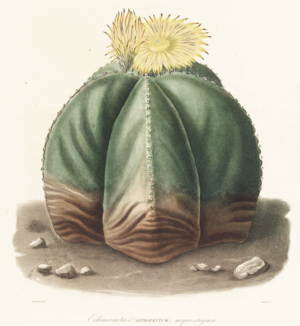Bishop's cap cactus facts for kids
Quick facts for kids Bishop's cap cactus |
|
|---|---|
 |
|
| Conservation status | |
| Scientific classification | |
| Genus: |
Astrophytum
|
| Species: |
myriostigma
|
| Synonyms | |
|
|
Astrophytum myriostigma, often called the bishop's cap cactus, bishop's hat, or bishop's miter cactus, is a special type of cactus. It grows naturally in the highlands of northeastern and central Mexico. This cactus is known for its unique star-like shape when it's young.
Contents
What Does the Bishop's Cap Cactus Look Like?
This cactus is quite unique because it doesn't have any spines! When it's young, it usually has three to seven (most often five) clear ridges running up and down its body. These ridges make the cactus look like a star from above, which is why its scientific name, "Astrophytum," means "star plant."
As the cactus gets older, it can grow more ridges. It also changes from a round shape to more like a cylinder. It can grow to be about 70 to 100 centimeters (about 2.3 to 3.3 feet) tall. It can also be 10 to 20 centimeters (about 4 to 8 inches) wide. In the wild, its body is covered with a soft, whitish fuzz. However, some types grown by people don't have this fuzz.
How Does This Cactus Grow and Flower?
In its natural home, the bishop's cap cactus usually blooms in early spring. This timing allows its seeds to grow well with the summer rains. When people grow it in gardens, it might flower in the summer instead.
The plant produces one or more flowers near its top. These flowers are about 4 to 6 centimeters (about 1.6 to 2.4 inches) across. They have many creamy yellow petals, sometimes with a touch of orange or red at the bottom. After insects or other means help the flowers get pollinated, they grow into a fuzzy, reddish fruit. This fruit is about 2 to 2.5 centimeters (about 0.8 to 1 inch) wide. It can take up to six years for these cacti to produce their first flowers. Many people like to grow A. myriostigma as an ornamental plant in their cactus collections because it's so interesting to look at.
Fun Facts About the Bishop's Cap Cactus
This amazing plant has received a special award called the Royal Horticultural Society's Award of Garden Merit. This award means it's an excellent plant for gardens.
Gallery
See also
 In Spanish: Astrophytum myriostigma para niños
In Spanish: Astrophytum myriostigma para niños











